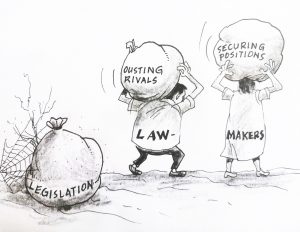As it goes, the country’s political landscape is marred by the pursuit of power and personal gain, overshadowing genuine efforts to address the nation’s pressing issues. This culture of excessive politicking, where leaders prioritize their interests over national welfare, has deeply disrupted governance and stunted progress. It is a systemic rot that affects every aspect of Filipino life, from economic development to social cohesion.
The never-ending power struggle among politicians, often marked by shifting alliances and betrayals, glaringly prevails. The recent chaos in the Philippine Congress, where leadership squabbles have delayed critical legislation, epitomizes this dysfunction. Instead of focusing on passing laws that could improve the lives of Filipinos, lawmakers are preoccupied with ousting rivals and securing positions. Similarly, local politics is rife with dynastic control, where families treat political offices as their personal property, perpetuating corruption and incompetence. The result? A government that is constantly distracted, failing to address urgent issues like poverty, unemployment, and disaster response.
The dire effects of this toxic political culture are evident in the country’s vulnerability to crises. Take, for instance, the inadequate response to Super Typhoon Yolanda in 2013, which revealed not just logistical challenges but also deep-seated political rivalries that hindered relief efforts. Instead of working together, local and national leaders were caught up in finger-pointing and blame games, leaving millions of Filipinos to suffer. The inability to transcend political differences during such critical moments demonstrates the dangerous consequences of prioritizing politics over people.
To end this destructive cycle, Filipino voters must take a stand. They hold the power to reshape the nation by electing leaders who are committed to public service rather than personal ambition. It is essential to move beyond personality politics and patronage, where votes are often swayed by temporary favors or empty promises. Voters must critically assess the track record, platforms, and integrity of candidates, rejecting those who perpetuate the status quo of self-serving leadership. This calls for a more informed electorate, willing to demand accountability and transparency from their leaders.
Our country’s stability and future depend on breaking free from this despicable culture of excessive politics. As the country approaches another election cycle, the Filipino people have a unique opportunity to steer the nation toward genuine progress. Reject the leaders who prioritize power over service; pave the way for a government that truly works for the people. It is time to rebuild trust, prioritize the common good, and put an end to the politicking that has long plagued the nation.




